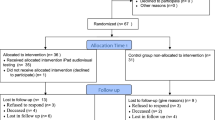Abstract
Most people with cancer have a combination of treatments, such as surgery with chemotherapy and/or radiation therapy. Providing good quality cancer-related information enables patients to be better prepared for treatment and improves their adherence. This study aimed to determine the level of information received and the perceived usefulness of the sources of information to cancer patients. A 4-month study was conducted at a day care oncology unit and oncology ward of a tertiary care centre in Malaysia using the European Organisation for Research and Treatment of Cancer Quality of Life Questionnaire Information Module (EORTC QLQ-INFO 25). In total, 103 patients successfully completed the questionnaire. Level of information received was moderate. Patients were well-informed about medical tests (mean ± SD = 74.2 ± 17.8) followed by the disease itself (mean ± SD = 68.0 ± 13.6). Patients received less information on both other services (mean ± SD = 47.6 ± 18.1) and different places of care (mean ± SD = 41.3 ± 22.3). Although the correlation between age and level of information received was poor (r = − 0.201; P = .042), younger patients (≤ 65 years old) were found to have higher level of information received than older patients (mean ± SD = 61.5 ± 11.2 versus 57.8 ± 6.6; P = .046). Doctors (mean ± SD = 88.1 ± 17.1), nurses (mean ± SD = 83.7 ± 20.3), and family members (mean ± SD = 81.1 ± 24.9) were the most useful sources of information by cancer patients. There is still a need for improvement in the provision of information by the healthcare team and prioritisation should depend on patients’ individual characteristics and their needs of information. More attention is needed in delivering required information especially to older patients.


Similar content being viewed by others
References
The Malaymail. Cancer fourth biggest killer in Malaysia, Health Ministry survey shows. Available at: https://www.malaymail.com/news/malaysia/2018/10/09/cancer-fourth-biggest-killer-in-malaysia-health-ministry-survey-shows/1680680. Accessed 9 Oct 2019
Lim SM, Kim HC, Lee S (2013) 2013. Psychosocial impact of cancer patients on their family members. Cancer Res Treat 45(3):226–233
Russell BJ, Ward AM (2011) Deciding what information is necessary: do patients with advanced cancer want to know all the details? Cancer Manag Res 3(1):191–199
van der Meulen N, Jansen J, van Dulmen S et al (2008) Interventions to improve recall of medical information in cancer patients: a systematic review of the literature. Psychooncology. 17(9):857–868
James C, James N, Davies D et al (1999) Preferences for different sources of information about cancer. Patient Educ Couns 37:273–282
Arraras JI, Greimelb E, Sezerc O et al (2010) An international validation study of the EORTC QLQ-INFO25 questionnaire: an instrument to assess the information given to cancer patients. Eur J Cancer 46(15):2726–2738
Rutten LJF, Arora NK, Bakos AD et al (2005) Information needs and sources of information among cancer patients: a systemic review of research (1980-2003). Patient Educ Couns 7(3):250–261
Tariman JD, Doorenbos A, Schepp KG et al (2014) Information needs priorities in patients diagnosed with cancer: a systematic review. J Adv Pract Oncol 5(2):115–122
Fletcher C, Flight I, Chapman J et al (2016) The information needs of adult cancer survivors across the cancer continuum: a scoping review. Patient Educ Couns 100(3):383–410
Carlsson M (2000) 2000. Cancer patients seeking information from sources outside the health care system. Support Care Cancer 8(6):453–457
Mistry A, Wilson S, Priestman T et al (2010) How do the information needs of cancer patients differ at different stages of the cancer journey? A cross-sectional survey. JRSM Short Rep 1(4):30
Anderson RC, Franke KA (2001) Psychological and psychosocial implications of head and neck cancer. Int J Ment Health 1(2):1–7
Suriati G, Colonius A, Narimah S et al (2012) Knowledge and awareness of Malaysian cancer patients and their family towards facing and coping with cancer. Health Environ J 3(2):38–50
Hautamäki-lamminen K, Lipiäinen L, Beaver K et al (2013) Identifying cancer patients with greater need for information about sexual issues. Eur J Oncol Nurs 17(1):9–15
Degner LF, Kristjanson LJ, Bowman D et al (1997) Information needs and decisional preferences in women with breast cancer. JAMA. 277(18):1485–1492
Davison BJ, Gleave ME, Goldenberg SL et al (2002) Assessing information and decision preferences of men with prostate cancer and their partners. Cancer Nurs 25:42–49
Iconomou G, Psychologist H, Viha A et al (2002) Information needs and awareness of diagnosis in patients with cancer receiving chemotherapy : a report from Greece. Palliat Med 16:315–321
MacFater H, MacFater W, Hill A et al (2017) Individualised follow-up booklets improve recall and satisfaction for cancer patients. N Z Med J 130(1451):39–45
Mills ME, Davidson R (2002) Cancer patients’ sources of information : use and quality issues. Psychooncology. 11:371–378
Mekuria AB, Erku DA, Belachew SA (2016) Preferred information sources and needs of cancer patients on disease symptoms and management : a cross-sectional study. Patient Prefer Adherence 10:1991–1997
Avery M, Williams F (2015) The importance of pharmacists providing patient education in oncology. J Pharm Pract 28(1):26–30
Author information
Authors and Affiliations
Corresponding author
Ethics declarations
The study was performed in accordance with the ethical standards of the institutional research committee (Research Ethics Committee of the Universiti Kebangsaan Malaysia Medical Centre: UKM PPI/111/8/JEP-2017-056) and with the 1964 Helsinki declaration and its later amendments or comparable ethical standards. Written informed consent was obtained from each participant.
Conflict of Interest
The authors declare that they have no conflicts of interest.
Additional information
Publisher’s Note
Springer Nature remains neutral with regard to jurisdictional claims in published maps and institutional affiliations.
Rights and permissions
About this article
Cite this article
Lew, Y.L., Ismail, F., Abdul Aziz, S.A. et al. Information Received and Usefulness of the Sources of Information to Cancer Patients at a Tertiary Care Centre in Malaysia. J Canc Educ 36, 350–358 (2021). https://doi.org/10.1007/s13187-019-01637-9
Published:
Issue Date:
DOI: https://doi.org/10.1007/s13187-019-01637-9



